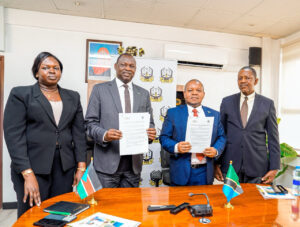By Business Insider Reporter

Tanzania’s economy is expected to grow by around 6 percent in the 2025/2026 financial year, according to government projections.
But despite this optimistic forecast, a range of pressing economic obstacles threatens to slow down progress and put key development goals at risk.
The government plans to raise spending by 13.4 percent to TSh 57.04 trillion ($22 billion), a move designed to fund infrastructure, service delivery and the upcoming general election.
However, analysts warn that the swelling national debt and fiscal pressures could become increasingly difficult to manage.
Figures from the Ministry of Finance show public debt reached TSh 97.35 trillion by June 2024, up 18.36 percent from the previous year.
The growing share of commercial loans in the debt portfolio is also raising concerns over rising interest repayments and debt sustainability.
“Our fiscal space is tightening,” said a senior economist who requested anonymity. “If we don’t match spending with improved domestic revenue collection, we risk pushing the debt burden to unsustainable levels.”

Beyond fiscal constraints, climate change looms as another major threat.
Tanzania’s economy, heavily reliant on agriculture, faces growing risks from droughts, floods, and other climate shocks.
These conditions continue to affect crop yields and food security, placing millions of livelihoods at risk and straining the national budget.
Meanwhile, efforts to boost foreign direct investment (FDI) are being held back by persistent structural challenges. Although Tanzania has taken steps to improve its business environment, investors still cite bureaucratic red tape, policy inconsistencies, and infrastructure bottlenecks as major barriers.
“We continue to see interest from global firms,” said an official from the Tanzania Investment Centre. “But too often, delays in obtaining permits and dealing with regulatory agencies frustrate that interest.”
Population pressures are also adding to the burden. Tanzania’s population is growing at a rate of nearly 3 percent annually, leading to higher demand for education, healthcare, and jobs.
This demographic trend poses long-term challenges for service delivery and job creation.
Regional tensions have also emerged as potential flashpoints. In early 2025, a trade spat with Malawi led to a temporary ban on the cross-border movement of agricultural products, affecting both countries’ economies before diplomatic intervention brought the issue under control.
Despite these challenges, the government remains upbeat. Finance Minister, Dr. Mwigulu Nchemba, told parliament last month that “strategic investments and sound reforms” will drive Tanzania’s transformation and ensure inclusive growth. As the new financial year approaches, economists stress that managing debt prudently, strengthening climate resilience, and ensuring policy predictability will be key to sustaining Tanzania’s growth momentum.








